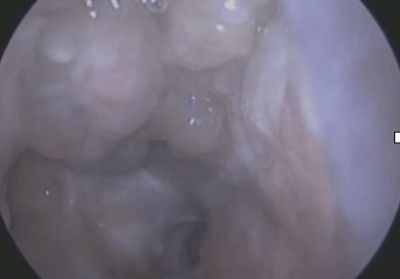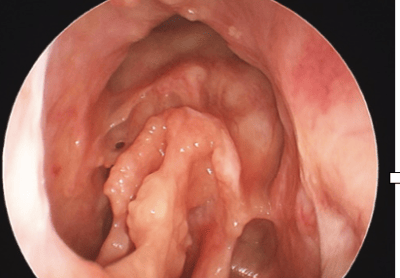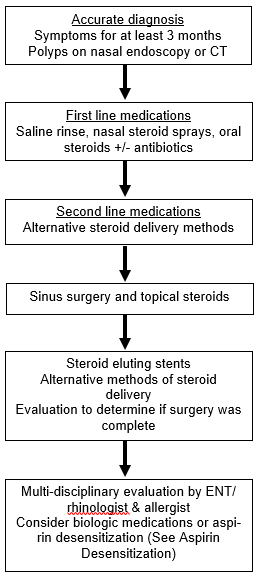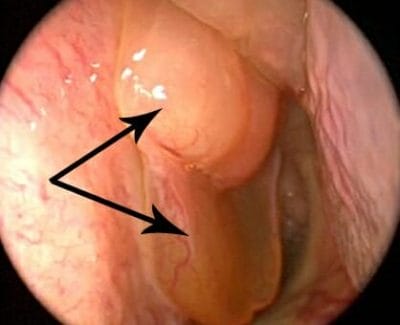What Are Nasal Polyps and How Are They Diagnosed?
The four pairs of paranasal sinuses are located in the facial bones between the eye and the brain. These are air filled cavities. If the lining of a sinus becomes inflamed (as in chronic rhinosinusitis) it may begin to swell and form a grape like structure that can block the sinus. This is called a polyp. Unlike colon polyps, nasal polyps are not cancerous.
Most patients will describe symptoms of nasal congestion, loss of smell, and facial pain or pressure. Other people will mention cough, nasal drainage, difficulty sleeping, and poor quality of life.
Doctors will perform an exam using a small camera to look inside the nose (See Nasal Endoscopy). Your doctor may also order a special X-ray called a CT scan to evaluate all the sinuses.
How Are Nasal Polyps Treated?
Doctors usually first prescribe medication to treat polyps. This may include oral antibiotics for up to 3 weeks, nasal steroid sprays and/or oral steroids (not just a steroid shot). If these medications fail, sometimes alternative forms of steroids are considered. These “second” line medications are given by a different type of delivery system to help the medicine get deeper into the nose.
Initial Medications for Nasal Polyps
- Saline rinses
- Nasal steroid spray
- Oral steroid (prednisone burst)
- Doxycycline or other antibiotic
Second Line Medications
- Steroid rinses
- Xhance
If medical therapy fails, endoscopic sinus surgery becomes an option. Sinus surgery is indicated if patients are struggling with nasal symptoms and a CT scan confirms significant sinus inflammation.
What Is Sinus Surgery?
Most sinus surgery consists of making the small natural openings in the sinuses much larger. Endoscopic sinus surgery is performed using small cameras and biting instruments. In addition, computers may be used to help guide the surgery (See Image-Guided Surgery). This allows for a safer and more complete operation. A more complete sinus operation allows for more medication to be delivered to the sinuses after surgery. It also allows for a faster recovery. The majority of sinus surgeries can be performed as an outpatient. This means that most patients can go home on the day of surgery. A few patients may need to be kept in the hospital for overnight observation depending on their age and overall health. The majority of patients do not need multiple sinus operations. 95% of patients report that they would have surgery again.
Goals of Sinus Surgery
- Remove polyps
- Open sinuses widely so that steroid rinses can get in
Results of Sinus Surgery
- Symptom improvement in 80% of patients
- <1/3 need revision surgery
- 95% would do it again
Are All Sinus Operations the Same?
No, they are not. It is important to realize that limited surgery and balloon sinus dilatation may not provide large enough openings for delivery of topical nasal medicines designed to keep nasal polyps from re-growing. Prior surgery, the presence of nasal polyps, severe allergy issues including allergy to aspirin, and other complicated medical problems all can make sinus surgery more difficult. Every individual is different. Surgical approaches are altered according the needs of each patient.


How Long Will It Take To Recover From Sinus Surgery?
It depends. Most people will plan to be out of work for 5-7 days after surgery depending on the extent of surgery. Patients with very physically demanding jobs may need to be off longer. Patients that can sit at a desk or work from home on a computer may be able to work in just a few days. Typically a few narcotic pain pills are prescribed after surgery. But with more restrictions on the use of narcotics, sometimes other medications are used to help with controlling discomfort.
Long Term Management
There is no known cure for nasal polyps at this time. The goal of treatment is to control the chronic inflammation and symptoms. Typically, topical nasal steroids are used following surgery. Steroid nasal rinses have been proven to be very safe and less expensive than other types of therapy. Once surgery has been completed, your ENT doctor will need to perform regular exams with an endoscope to look in the nose and make sure that the polyps are not returning. If patients consistently follow their post-operative medical routine, they usually will not need to have multiple sinus operations.
Recently, a new category of drugs that was designed for severe eczema and asthma has now been approved for the most complicated patients with chronic nasal polyps. These new drugs are called biologics and they alter the immune system as they control inflammation. They are injected into the skin regularly and are extremely expensive. But they can be quite effective when other therapies have failed.
Common side effects of these drugs include allergic reactions, cold sores, and inflammation of the cornea (eye). If patients do have favorable results and the shots are stopped, polyps typically recur within a few months. For these reasons, these new immune system altering drugs are offered only in the most difficult and challenging cases. Your ENT doctor may discuss this new class of medications if they are needed.

Copyright © 2020 by the American Rhinologic Society

